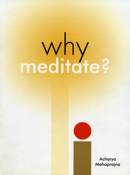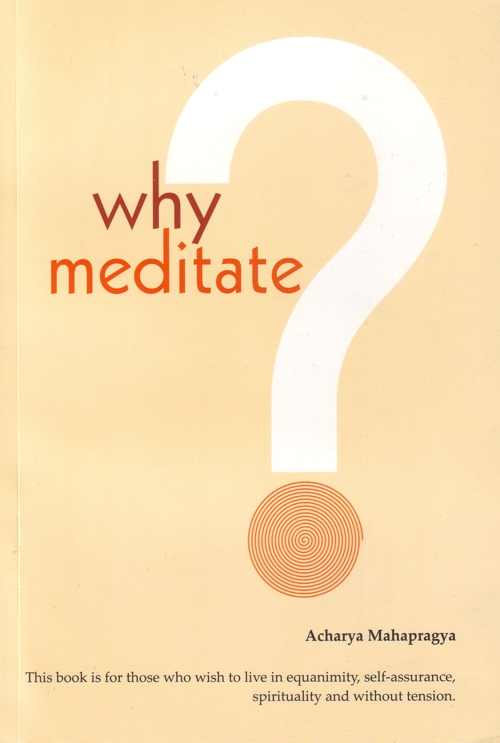

There is a question: Why is there any need for Sadhna (spiritual practice)? Our sense organs are healthy, our mental faculty and intellect are functioning well. Our home is equipped with all comforts, why, then, is there a need to do Sadhna? We need to ponder deeply to get the answer to this question.
Life is a battle. A person struggles to live. This struggle sometimes takes place in the external world, but it goes on continuously, day & night in the inner world. There are two fundamental entities in the world - sentient and non-sentient. One is the soul and the other is the matter or Pudgal. There is a constant struggle between soul and Pudgal. The soul wishes to retain its form but the gross material world does not allow it to do so. Pudgal has been so built that it pulls the soul towards itself. Acharya Pujapada wrote very beautifully: “Pudgal is satisfied with Pudgal (matter).” The physical body is made up of Pudgal. So it is appeased with just Pudgal. It needs food, water and other things besides these. The body is a cause of discomfort when its expectations and desires are not fulfilled. Accordingly, we can say that Pudgal is satisfied with Pudgal, consciousness is content with consciousness and soul is pleased with the soul. Pudgal attracts consciousness but consciousness wants to stay away from it. The struggle between consciousness & Pudgal takes place constantly.
In this struggle, the person who ignores or neglects the demands of Pudgal wins. It is thus a question of losing and winning. A person who fulfils the demands of matter, loses. The person who does not fulfil the demands of matter but goes against the tide emerges as a winner. If we keep on fulfilling the demands of the material world of Pudgal, it means we flow along with them. In this stage, we accept defeat in the world of consciousness. Whenever the demand comes from the world of Pudgal, we must have the discriminatory power to discern which demand to fulfil and which to ignore. The material world does not overwhelm a person who has this discriminatory power. However, our entire behaviour is influenced by Pudgal. We take the help of Pudgal for all necessary functions like eating, speaking, thinking, living, etc. Our world has become so grossly materialistic that the concept of atheism has come into vogue.
One who believes in the soul and Parmatma (Liberated Soul) is called a theist. A person who does not believe in the doctrines of soul, Parmatma and rebirth is called an atheist. If any one were to ask me which of these two modes of thought is simpler and more natural, I would answer, “Atheism.” An atheist does not need to do anything, but theists have to face many difficulties because the soul is incorporeal, invisible and difficult to reach. It is difficult to prove the existence of an incorporeal element. The elements, which are corporeal and visible, are evident. Because there is no difficulty for atheists, voluminous literature has not emerged on the philosophy of atheism. But innumerable volumes have been written to prove the existence of the soul. The struggle is not between the doctrine of atheism and theism, but is in the realm of philosophy too. Struggle is thus intrinsic to every human being.
In the beginning of this chapter, I raised the question why does a man do Sadhna. Why does he attend meditation camps & why does he waste his precious time for ten days? The answer to these questions would be: One who wants to be a victor practices Sadhana. The loser does not need to put in any effort to practice Sadhana. He can merrily enjoy life by eating, drinking, sleeping, having fun and finally ending this play of life. He does not need to put in so much effort. One who wants to be a winner in this struggle must be self-aware and practice austerities, meditation and self-introspection, etc.
Many years ago, I had written an article that was published in the magazine Kadambini. It provoked a lot of discussion. I wrote, “Hunger is natural but fasting is not. Anger is natural but not forgiveness, sexual desire is natural but not celibacy.” It became a big issue. But can we ponder whether these are not natural for living beings in the gross world (of Pudgal)?
Eating, drinking, sleeping and having sex are all natural instincts. To get angry is also natural. An administrator once said, “If we don't get angry, our administration will not run.” Anger is considered be a natural instinct. Forgiveness needs to be cultivated. No one advises you to get angry but for the development of forgiveness, many camps and workshop have been held. We have never heard about any camps or workshops that teach us how to get angry. Yet every one gets angry. Even a small child knows how to get angry.
This is a tricky issue - we want to give up that which is natural, & we want to cultivate that which is unnatural. This is precisely where the struggle lies. If we accept what is natural, then there is no conflict at all. There is no need for any practice.
An atheist once told his wife, “Eat, drink, and be merry. If you don't enjoy now, time will slip by. You won't get this invaluable human life again. Don't be scared about your next birth. There is nothing after this life. Do whatever you wish in this life. Borrow if you must, and enjoy delicious food cooked in ghee.” An ancient writer penned these words: Rinam kritva ghritam pibet. A writer of today would say, “Borrow if you must and enjoy alcoholic beverages.” This is also one point of view. Sadhana is not required, wherever this perspective prevails.
From the standpoint of spirituality, this seems to be the perspective of a loser. A person who accepts defeat (by entering into the material realm) submits to the rule of Pudgal and can think in this manner. It seems that there is enjoyment in the external world but struggle is always present in the inner world. No matter how attached a person is to the world of Pudgal, consciousness repeatedly awakens him, saying, this is not your kingdom, not your home. One gets motivation as well as a warning from the inner world, which summons one to be prepared for the struggle. Then, one thinks, this life is not good. It looks good, but in reality, it is not. When one faces bad consequences, one does a turnaround and searches for a new path - and that path is Sadhana. The question is: Why does one choose the path of Sadhana? One chooses this new path to seek the way to success and victory, and to get away from the temptations of the material world. When these enlightened thoughts dawn in the mind, then one tries to stay away from all these kinds of activities. It is at this point that the consciousness of detachment awakens.
Attachment is the nature of the gross world (of Pudgal). Bondage will keep occurring there. The bondage is of such a high degree that a man will not be able to give up a single thing, for example, if you give money to a small child, it is easy to give, but difficult to take it back, because the instinct of attachment is natural. The world of Pudgal and attachment function simultaneously.
 Acharya Mahaprajna
Acharya Mahaprajna
 Copyright by Acharya Mahaprajna ©2005
Copyright by Acharya Mahaprajna ©2005